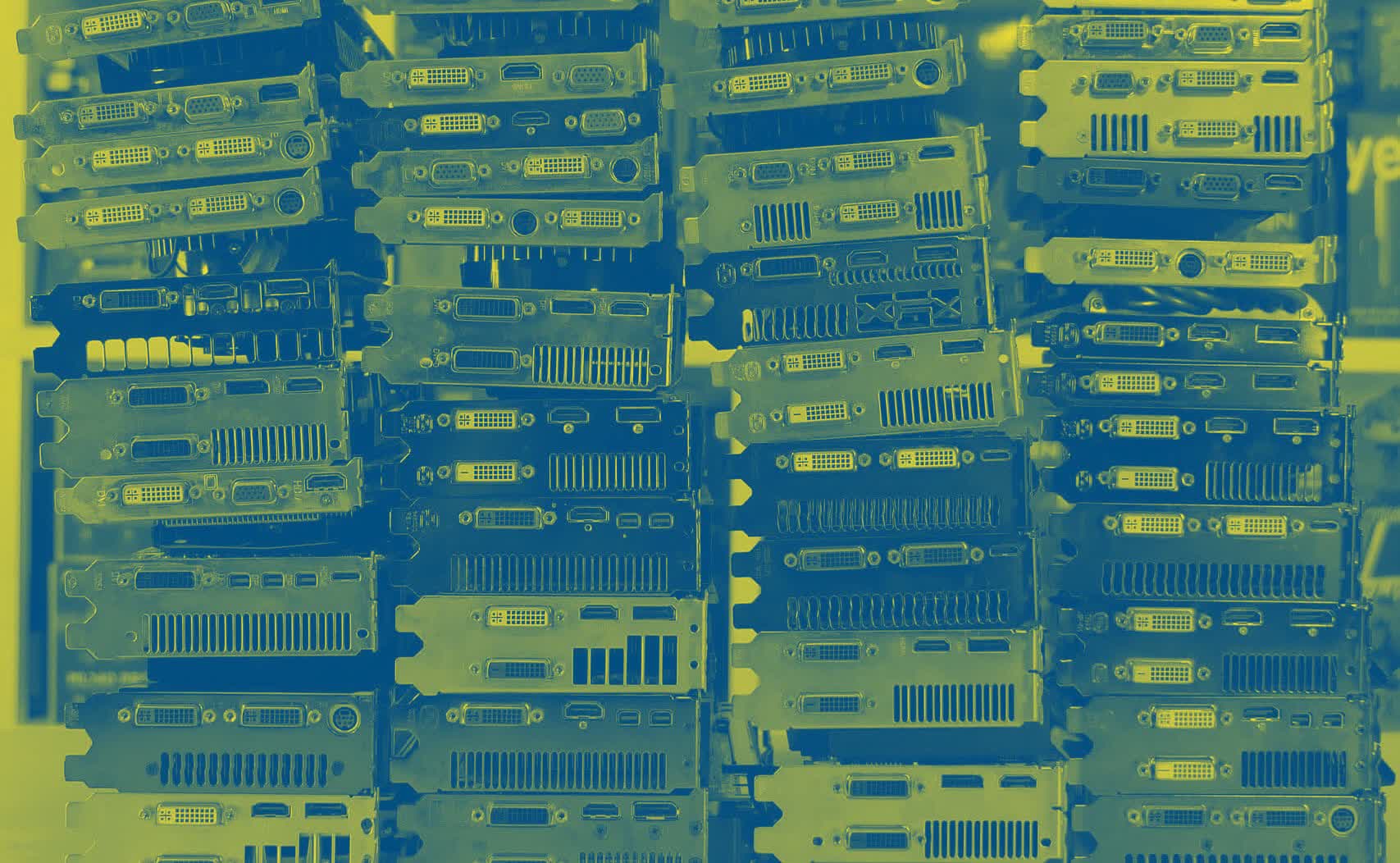It's time for our monthly update into graphics card pricing and availability, a series that we've been running since March, giving us a ton of useful insight into the current state of the GPU market. Graphics cards are still quite difficult to purchase at reasonable prices in most regions, but the month of August in particular has seen a number of developments that are worth talking about.
Updated: See our latest GPU Pricing Update here.
The market is still facing complications that are affecting GPU prices. If you're new to this series, in previous articles we've described this as a multi-factor situation. Many people are quick to place all the blame on one area or another, but the reality is there are many contributing factors. As we sit here in August, high demand for gaming GPUs, cryptocurrency mining, supply shortages for key graphics card components, limited wafer allocations at fabs, logistics issues due to the global pandemic, tariffs and several other reasons are all contributing to the current state of the market. It's a complicated situation.
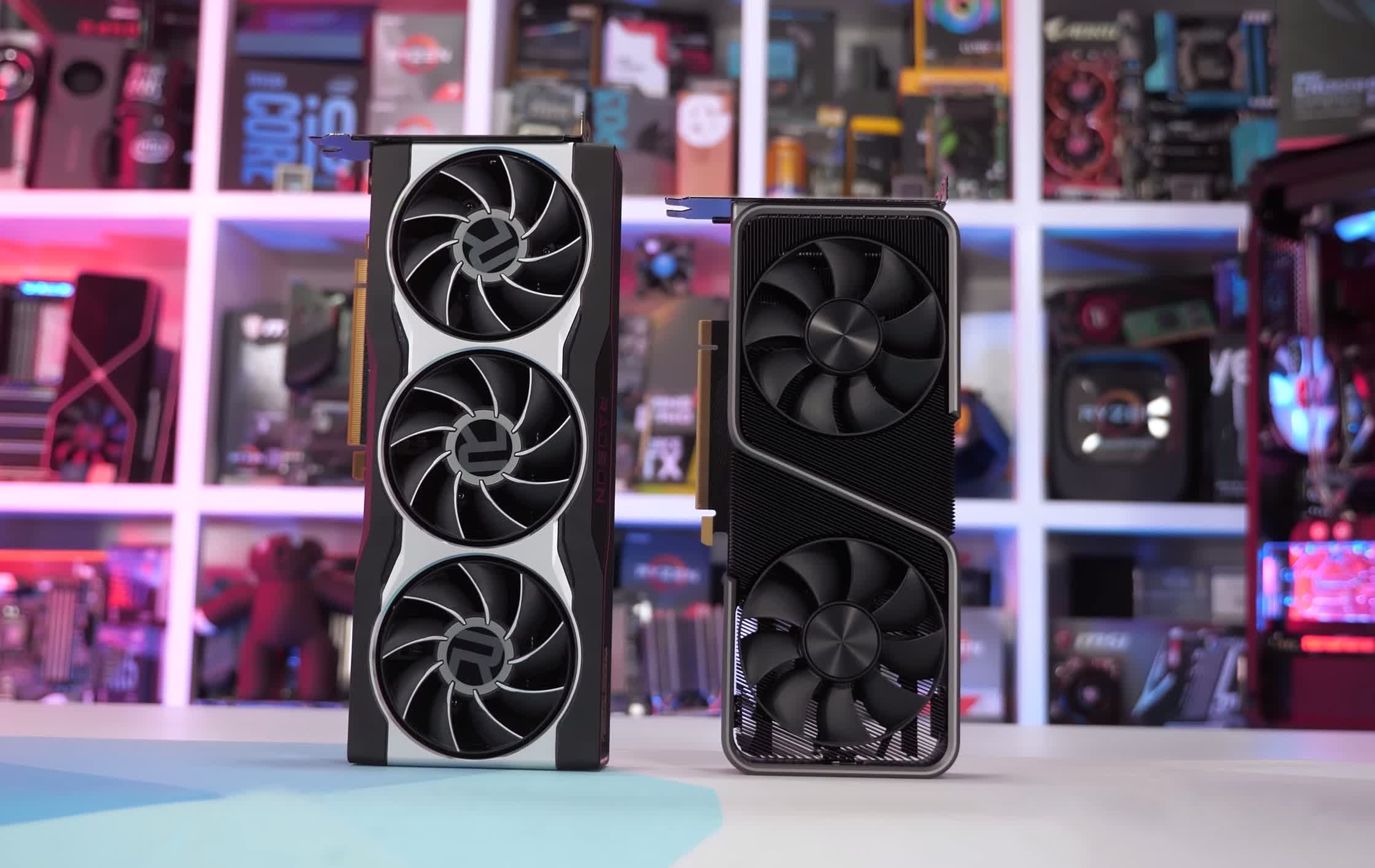
A couple of weeks back we ran a survey, asking HUB's YouTube community what factor you blame the most for current GPU prices. 41% of people responded that global supply constraints for components was the main driver, while a further 32% placed the most blame on cryptocurrency mining. Indeed, these two factors appear to be the most significant at play at the moment. Interestingly though, only 5% of users thought high demand from PC gamers was to blame.
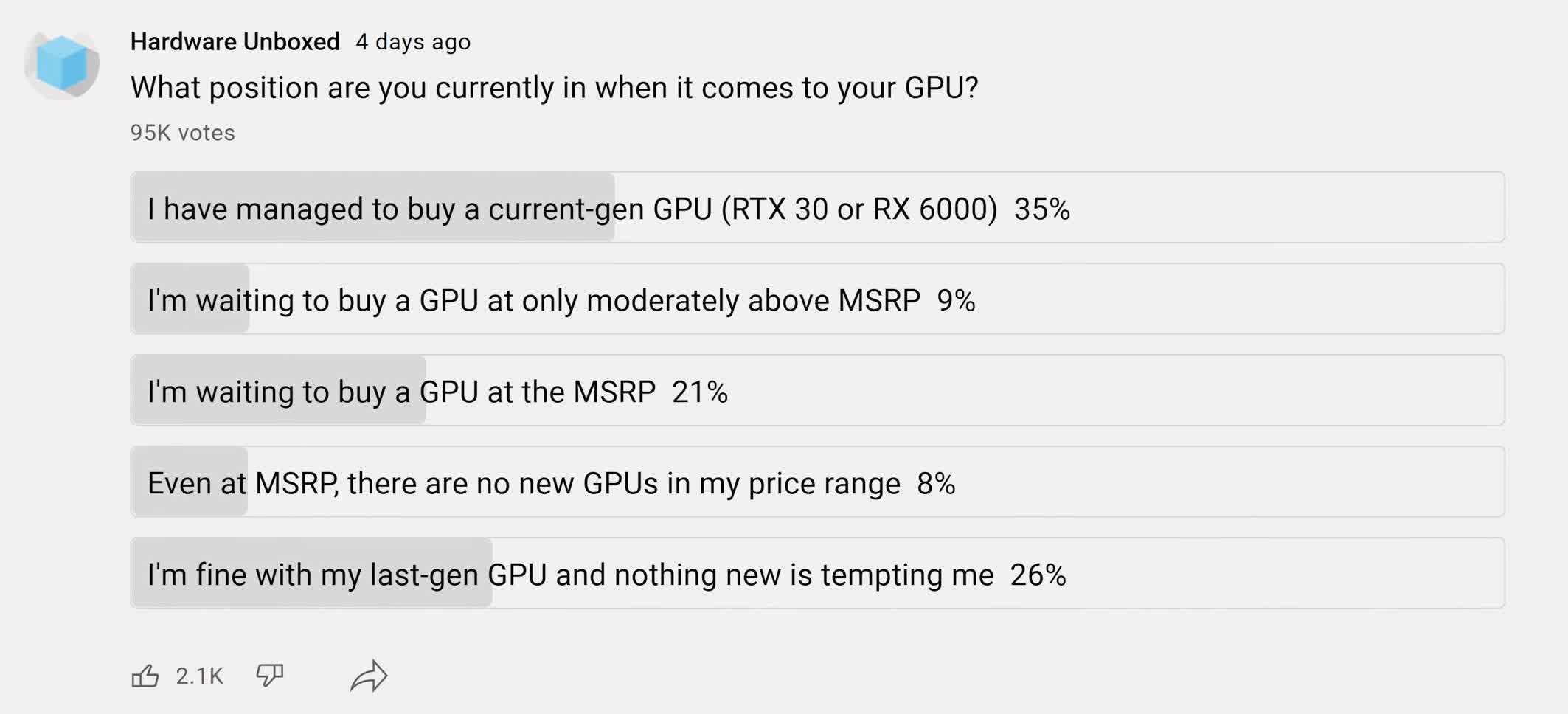
Market Update
Let's talk about what's happened this month. The launch of the AMD Radeon RX 6600 XT took place, which I think is fair to say received only lukewarm reception. A high MSRP, positioning it as a "1080p GPU," and issues with a limited x8 PCIe bus. There was some hope that a new mid-range GPU would help shift graphics card prices lower, but are we seeing that in the market today?
From certain angles, the answer is yes. As we talked about in our recent investigation of whether AMD lied about 6600 XT's ample stock and availability, the 6600 XT actually launched in reasonable quantities, far higher than any other recent GPU launch. This means that if you do want to spend around the $400 to $500 mark, depending on where you live, it's now easier to buy a GPU. In Australia, it's been 10 days since launch and you can still find 6600 XTs for as little as $680 AUD, which is $100 above the local MSRP but significantly cheaper than Nvidia's RTX 3060 and RTX 3060 Ti.
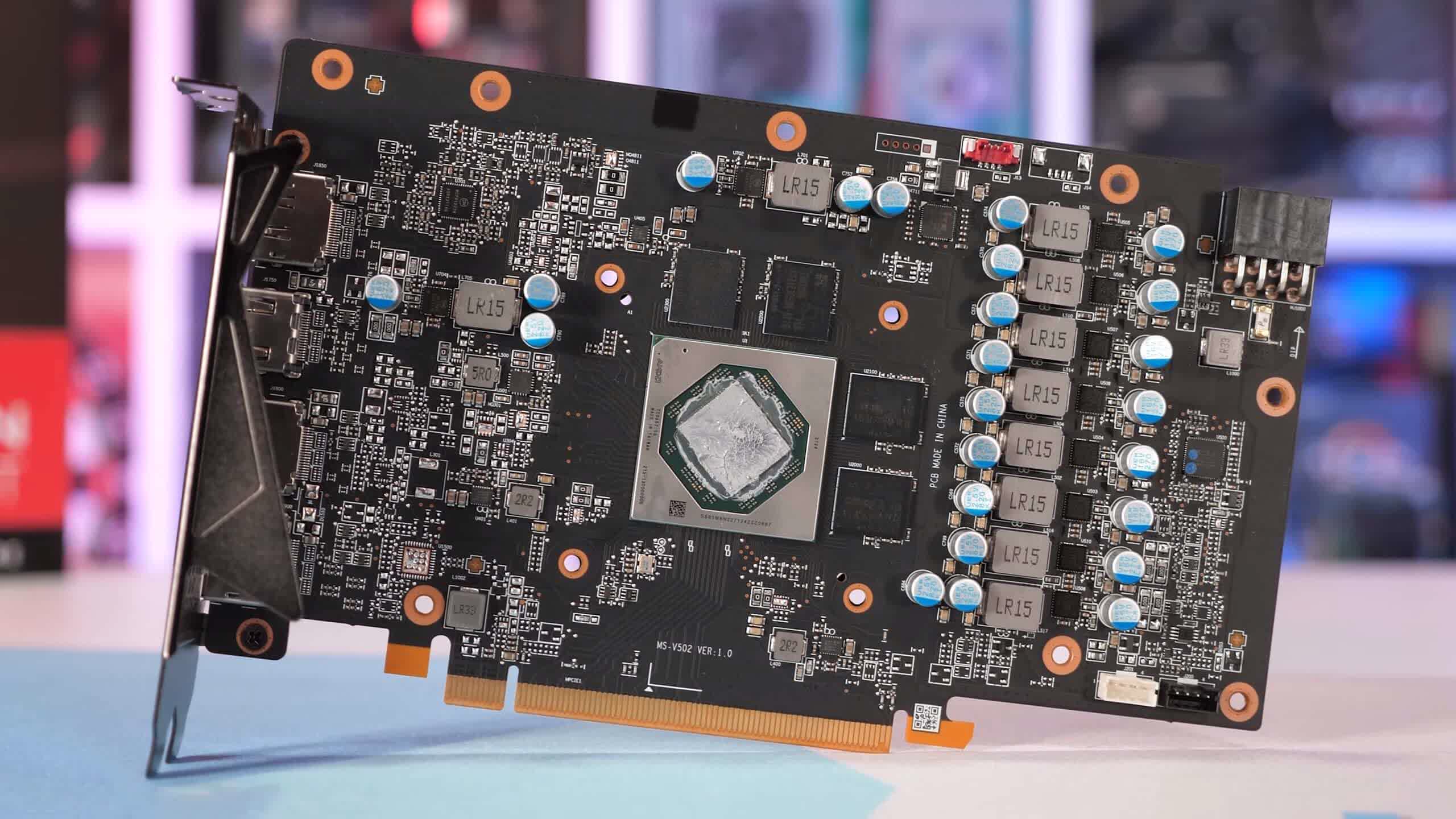
It's unlikely we'll see these GPUs hit the MSRP again soon, with retailers describing this $680 price as more the "true" MSRP based on the shipments they are seeing. And as we discussed at length in the 6600 XT availability investigation, despite these seemingly attractive prices, 6600 XTs aren't exactly flying off shelves since it doesn't offer killer value or performance compared to what you've been able to buy for the past few years.
We're also starting to see some movement on pricing for graphics cards around the 6600 XT. In particular, we're seeing increased shipments of GeForce RTX 3060 Ti GPUs with LHR (Lite Hash Rate). We've seen many more limited runs of cheaper 3060 Tis in the past few weeks than in prior months, which seems to be Nvidia's response to the 6600 XT. It's been pretty crazy to see some RTX 3060 Ti models available for less than the current going price for the RTX 3060, and retailers are telling us that as soon as they get stock they can price below $720, they just fly off shelves.
The RTX 3070 and 6700 XT remain quite expensive, and higher end models are either completely unavailable or still sitting on shelves at ridiculously inflated prices. That's something to keep an eye on in upcoming months.
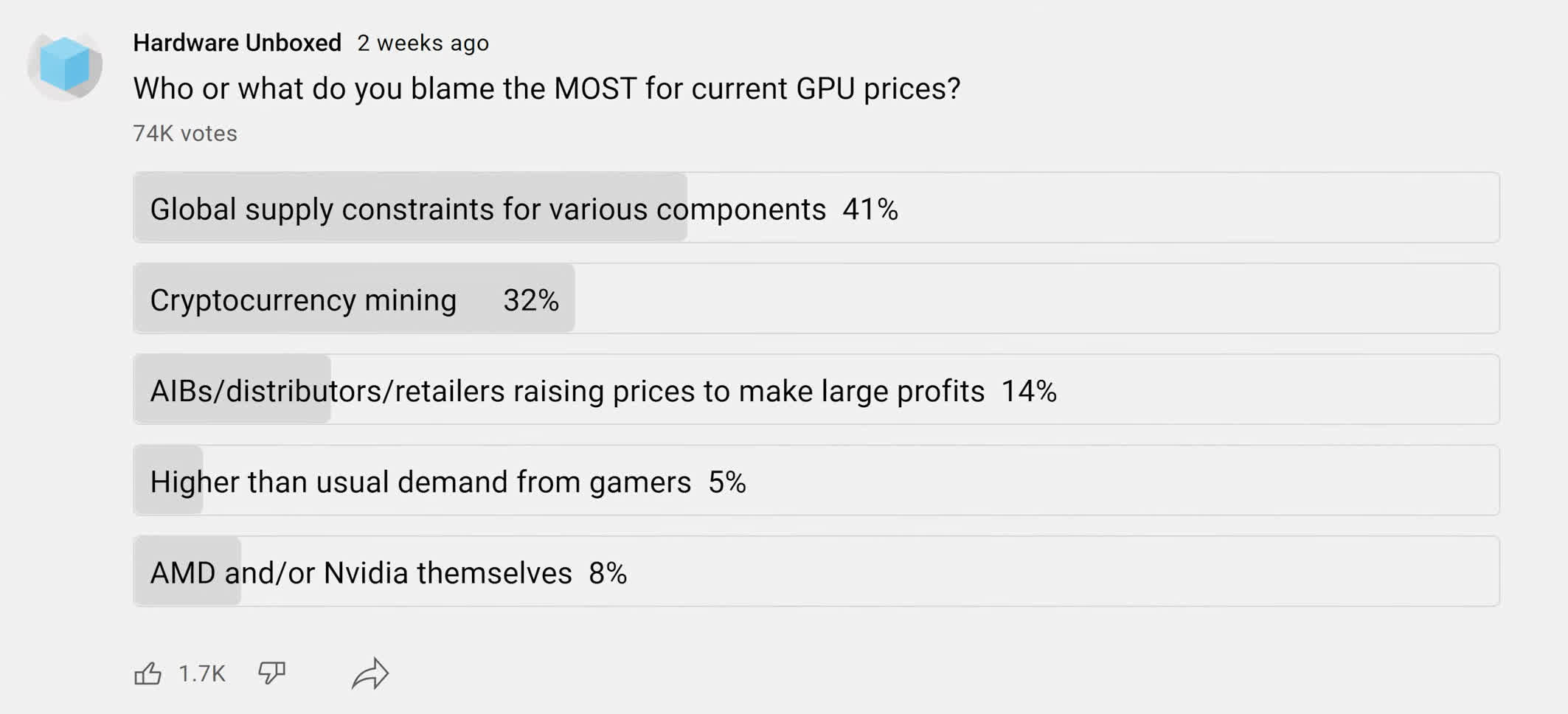
We also surveyed users about the position you are currently in with your GPU. A higher proportion than ever have said they have managed to buy a current-gen GPU. Of the respondents that do want to upgrade and aren't fine with their current GPU, just under half have been able to buy a new GPU, while around 40% are still waiting for price reductions. A further 11% of this group said there are no GPUs in their price range, indicating they are waiting for more entry-level cards to hit the market like a GeForce RTX 3050-type product.
Ethereum on the Rise
Other major updates this month concern the cryptocurrency market and crypto mining. We don't want to spend ages talking about mining since a lot has been going on, but we'll quickly summarize the key points on how this is affecting GPU pricing.
The price of popular coins such as Ethereum has risen substantially in the past month. Before we were looking at a price a little below $2,000, now it's above $3,000. Crypto is as always volatile, but the rough gains we are seeing month on month are 60% for this currency and similar for others. These gains have flattened out a bit over the last week.
Ethereum pricing chart
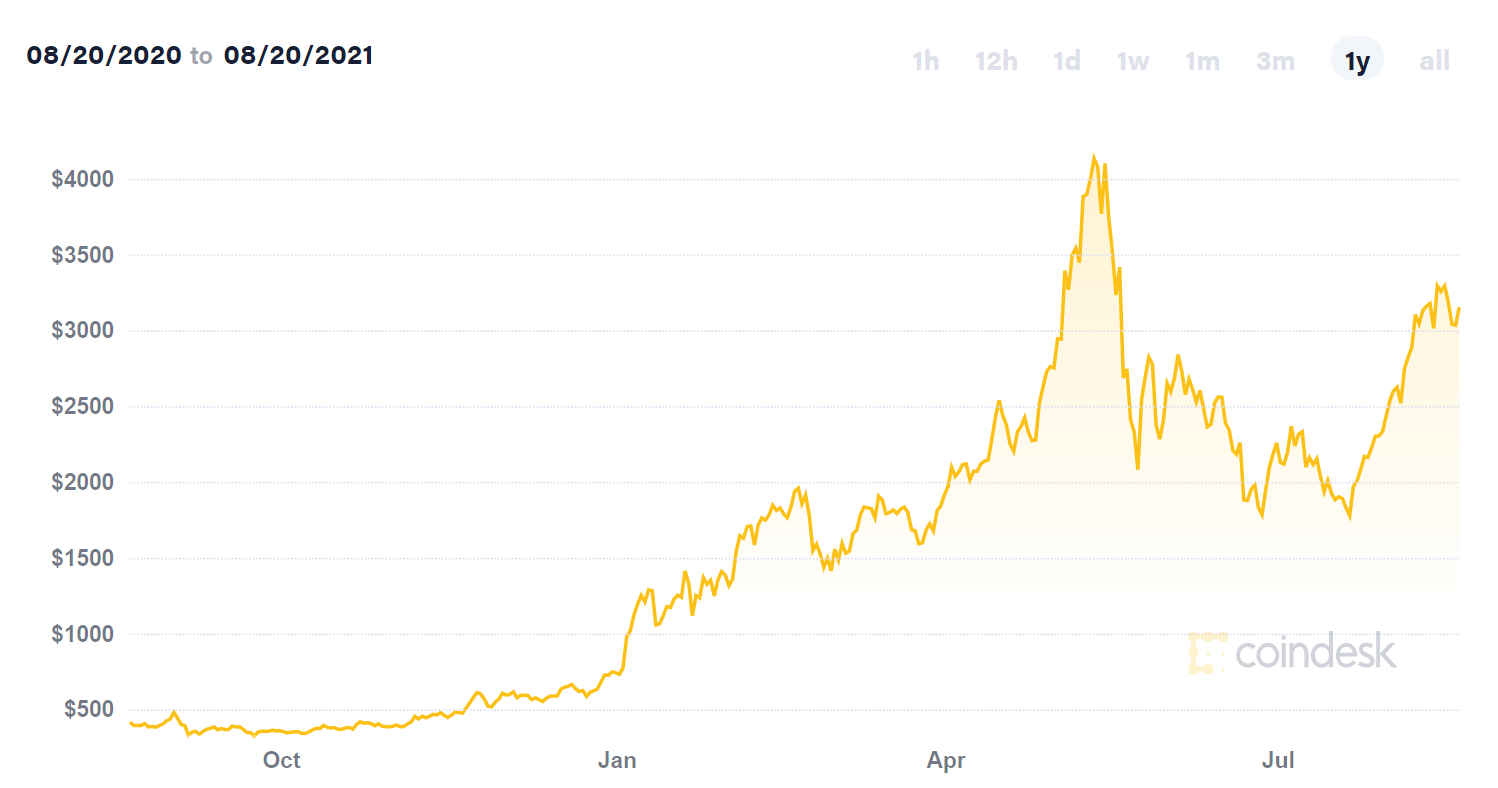
With gains in value come gains in difficulty. Ethereum difficulty has spiked recently to a near record level, reducing block rewards for miners. Miners are getting less Ethereum from mining, though the value of those coins has increased as well as the interest in mining.
Affecting Ethereum mining this month was the rollout of the new EIP1559 protocol upgrade. If you wonder how this affects mining revenue, the answer is simple: due to the way it burns transaction fees, the upgrade reduces the payout to miners for processing transactions. Like with difficulty spikes, while the reward in Ethereum is now lower, the value of Ethereum has increased, so it's a tug-of-war situation.
Software developers have also found a way to partially bypass the limit on Nvidia's Lite Hash Rate GPUs, increasing the cap on Ethereum mining performance from 50% to 70%. LHR cards still are less desirable for mining compared to the non-LHR variants, but are more desirable than before.
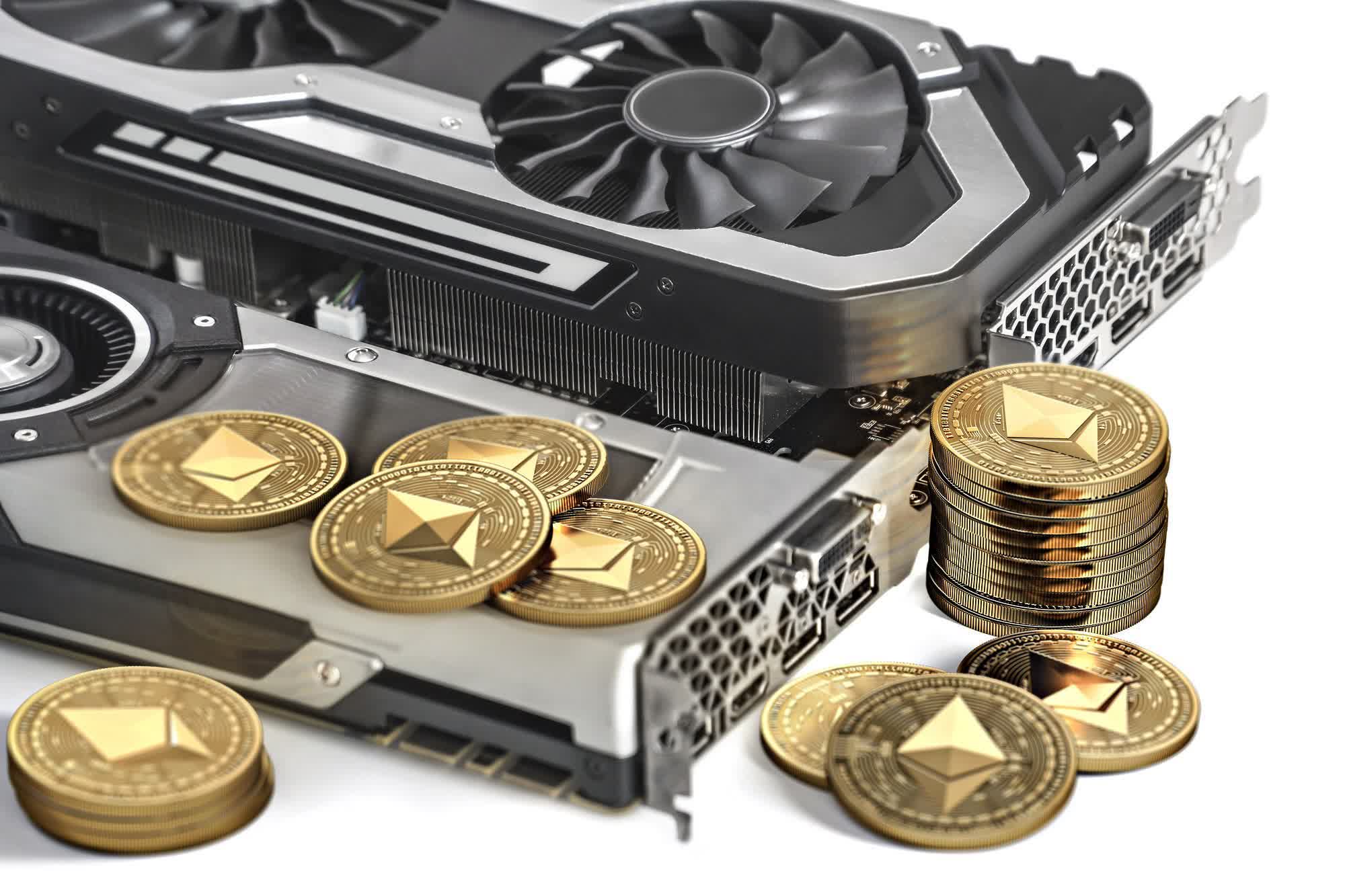
The final point to talk about with mining is that with all these recent updates – higher Ethereum prices but lower payouts and all of that – actually mining Ethereum isn't always what miners are doing on their GPUs. On some cards, coins such as Raven or Ergo have been more profitable, though as more people jump on these coins difficulty spikes on those coins, too, and so on.
Bottom line about GPU mining right now, the value of crypto has gone up significantly, around 60%, but the profitability of mining has risen to a more modest degree, around 20 to 30% month on month. Combined with the release of the 6600 XT and increased GPU supply, how has that affected the GPU market?
The Scalper Market
Much to our surprise, the scalper market on eBay has remained relatively flat comparing completed sales from the past week, to the same time last month. With a big spike in coin value I was expecting the market to react in a more dramatic way, similar to what we saw back in May when GPU prices were at their worst. But that hasn't been the case with most GPUs only fluctuating in price by a few percent.
Of course, there are outliers. The GeForce RTX 3070 was the most in-demand card in August, with prices rising the most of any current generation Nvidia GPU. Meanwhile, the RTX 3060 Ti went in the opposite direction with a 6% price cut on average, due to what appears to be the influx of LHR-limited models.
| MSRP | eBay Average Price June | eBay Average Price July | eBay Average Price August | Current Price Inflation | Price Increase July to August | |
|---|---|---|---|---|---|---|
| GeForce RTX 3090 | $1,500 | $2,962 | $2,599 | $2,607 | 74% | 0% |
| GeForce RTX 3080 Ti | $1,200 | $2,187 | $1,905 | $1,815 | 51% | -5% |
| GeForce RTX 3080 | $700 | $1,948 | $1,623 | $1,643 | 135% | 1% |
| GeForce RTX 3070 Ti | $600 | $1,323 | $1,085 | $1,170 | 95% | 8% |
| GeForce RTX 3070 | $500 | $1,261 | $1,075 | $1,228 | 146% | 14% |
| GeForce RTX 3060 Ti | $400 | $1,255 | $1,012 | $952 | 138% | -6% |
| GeForce RTX 3060 | $330 | $830 | $723 | $752 | 128% | 4% |
| Average | 109% | 2% |
The AMD RX 6900 XT increased the most in price, possibly due to a greater than expected drop in price last month. The card with the most volume, and in close competition to the RTX 3070, the Radeon RX 6700 XT, increased in price by 8 percent. Meanwhile, the scalper volume of AMD's higher end GPUs is very low, suggesting that AMD is mostly making their mid-range offerings at the moment.
While these numbers are an aggregate of all new GPUs sold through eBay in the last month, there's a difference in price between LHR and non-LHR cards, so if you are a gamer that doesn't care about mining, there is a chance that GPUs have gotten cheaper for you.
| MSRP | eBay Average Price June | eBay Average Price July | eBay Average Price August | Current Price Inflation | Price Increase July to August | |
|---|---|---|---|---|---|---|
| Radeon 6900 XT | $1,000 | $1,932 | $1,460 | $1,622 | 62% | 11% |
| Radeon 6800 XT | $650 | $1,450 | $1,282 | $1,268 | 95% | -1% |
| Radeon 6800 | $580 | $1,210 | $1,087 | $1,127 | 94% | 4% |
| Radeon 6700 XT | $480 | $907 | $733 | $793 | 65% | 8% |
| Radeon RX 6600 XT | $380 | $633 | 67% | |||
| Average | 92% | 5% |
The most stark difference is seen with the RTX 3060 Ti. The average sale price on eBay for this GPU was $950, while most LHR cards were selling for around $850. However, if you want a non-LHR model like the Founders Edition card and others, you're looking at having to spend at least $1,250. That's a 47% price hike for 43% higher mining performance after factoring in the latest LHR bypasses.
It's similar for models like the RTX 3080. The average sale price is currently $1,643, however LHR cards are going for $1,400 to $1,500, while non-LHR variants are in the $1,800+ range. For gamers, there is no reason to spend that extra money on the non-LHR variant, because the LHR cards are identical for gaming.
The Impact of Lite Hash Rate (LHR)
We recently received an Asus TUF Gaming RTX 3080 LHR variant to test and Steve found it was the same as the non-LHR card in gaming performance, with the same cooler design and thermals. This works across most LHR GPUs, and with the majority of new GeForce GPUs hitting the market now being LHR variants, there's nothing to worry about for gamers.
The discrepancy between LHR and non-LHR pricing is also why we see odd pricing trends, for example it explains why the RTX 3060 and RTX 3070 are relatively poor value, while the RTX 3060 Ti and RTX 3080 are looking better. The tide seems to have shifted for the 3060 Ti and 3080 to being mostly LHR releases, while there are still lots of non-LHR 3060 and 3070s being sold. Nvidia says the vast majority of GPUs moving forward will be LHR variants, which will hopefully see prices continue to decline over time.
What happens in the new GPU market is usually reflected in the used market, and that's also true this month.
Used GPU Pricing
Pricing for Nvidia's RTX 20 series were relatively flat month on month, after two consecutive months of double-digit price drops. For some reason, the RTX 2080 Ti increased in price by 10 percent, however most other GPUs in the line-up saw no price difference. A similar observation can be made for the GeForce 16 series, where most cards saw virtually no price changes. This is where having a lot of RX 6600 XTs at MSRP would be nice, as those with GTX 1660s could upgrade at virtually no cost after selling their old GPU.
| MSRP | eBay Average Price June | eBay Average Price July | eBay Average Price August | Current Price Inflation | Price Increase July to August | |
|---|---|---|---|---|---|---|
| GeForce RTX 2080 Ti | $1,000 | $1,219 | $952 | $1,043 | 4% | 10% |
| GeForce RTX 2080 Super | $700 | $887 | $788 | $802 | 15% | 2% |
| GeForce RTX 2080 | $700 | $834 | $686 | $703 | 0% | 2% |
| GeForce RTX 2070 Super | $500 | $784 | $638 | $667 | 33% | 5% |
| GeForce RTX 2070 | $500 | $678 | $603 | $614 | 23% | 2% |
| GeForce RTX 2060 Super | $400 | $707 | $613 | $615 | 54% | 0% |
| GeForce RTX 2060 | $350 | $549 | $476 | $482 | 38% | 1% |
| Average | 24% | 3% |
In the older GeForce 10 series, prices have risen slightly across the board, particularly for the higher end models like the GTX 1080 Ti. However the mid-priced options like the GTX 1070 Ti remain largely unchanged. It also appears that the volume of these older GPUs being sold is slowly reducing as first-time owners upgrade to newer GPUs.
| MSRP | eBay Average Price June | eBay Average Price July | eBay Average Price August | Current Price Inflation | Price Increase July to August | |
|---|---|---|---|---|---|---|
| GeForce GTX 1660 Ti | $280 | $481 | $428 | $426 | 52% | 0% |
| GeForce GTX 1660 Super | $230 | $495 | $425 | $452 | 97% | 6% |
| GeForce GTX 1660 | $220 | $430 | $359 | $371 | 69% | 3% |
| GeForce GTX 1650 Super | $160 | $326 | $291 | $283 | 77% | -3% |
| GeForce GTX 1650 | $150 | $295 | $248 | $247 | 65% | 0% |
| Average | 72% | 1% |
| MSRP | eBay Average Price June | eBay Average Price July | eBay Average Price August | Current Price Inflation | Price Increase July to August | |
|---|---|---|---|---|---|---|
| GeForce GTX 1080 Ti | $700 | $689 | $550 | $616 | -12% | 12% |
| GeForce GTX 1080 | $600 | $526 | $395 | $441 | -27% | 12% |
| GeForce GTX 1070 Ti | $450 | $467 | $398 | $406 | -10% | 2% |
| GeForce GTX 1070 | $380 | $403 | $337 | $361 | -5% | 7% |
| GeForce GTX 1060 6GB | $250 | $327 | $273 | $286 | 14% | 5% |
| GeForce GTX 1060 3GB | $200 | $234 | $189 | $223 | 12% | 18% |
| Average | -5% | 9% |
Then we get to AMD's Radeon RX 5000 series, and like in prior months it makes absolutely no sense for a gamer to consider these GPUs as a used upgrade option. The prices of cards like the 5700 XT remain high as the RDNA architecture is good for mining, punching well above its weight. If owners of the 5700 XT haven't already upgraded to something like the RX 6700 XT basically for free, then they should be seriously considering it if gaming is their primary use for these cards.
| MSRP | eBay Average Price June | eBay Average Price July | eBay Average Price August | Current Price Inflation | Price Increase July to August | |
|---|---|---|---|---|---|---|
| Radeon 5700 XT | $400 | $895 | $762 | $800 | 100% | 5% |
| Radeon 5700 | $350 | $806 | $719 | $730 | 109% | 2% |
| Radeon 5600 XT | $280 | $604 | $541 | $558 | 99% | 3% |
| Radeon 5500 XT 8GB | $200 | $440 | $363 | $344 | 72% | -5% |
| Average | 95% | 1% |
The volume of AMD's older high-end cards like Vega 56 and 64 has fallen away in the last few months. This month prices have risen substantially as they are capable mining GPUs. Meanwhile, in the lower part of the market, prices have risen somewhat for cards like the RX 580 8GB, though not to a more significant degree than other GPUs. It's still the case today that if you have $300-400 to spend and desperately want a GPU, you're much better off buying a GTX 1060 6GB than you are getting an RX 580 8GB, with the RX 580 a more powerful and more sought-after card for mining.
The State of the GPU
For the most part, GPU prices are still terrible and very poor value, and unfortunately throughout the last month we didn't see any further reductions to GPU prices on the used or scalper markets. This is disappointing for all those gamers that are still waiting for better GPU prices before they jump in and make a purchase.
And while GPU prices haven't fallen, they haven't increased substantially either, which I take as a positive considering cryptocurrencies have seen a surge. With Ethereum prices skyrocketing this month, and profitability up not just for Ether but other coins as well, seeing this reflect only stagnation on GPU prices rather than a massive spike is good news.
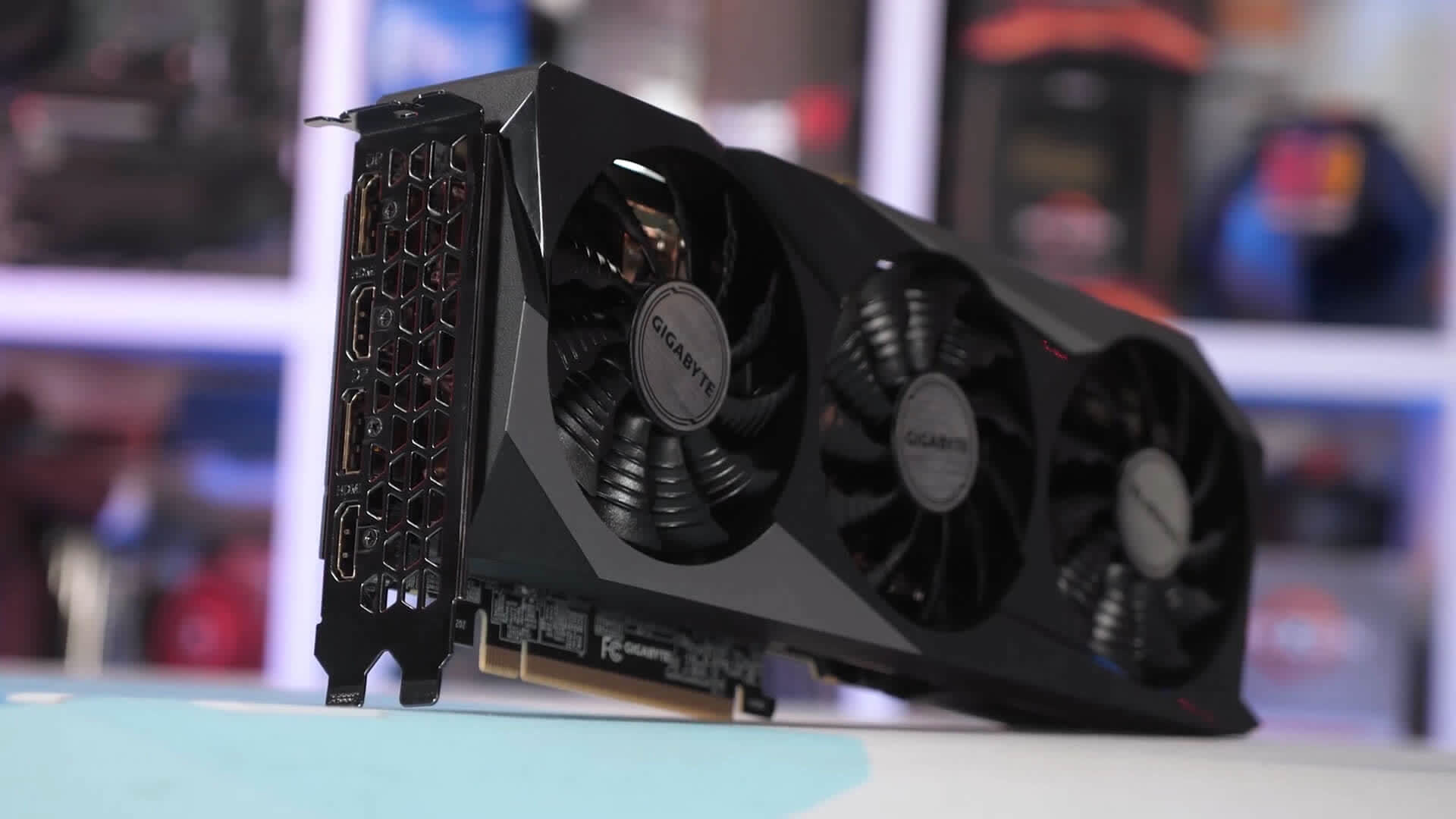
There are a few other glimmers of positivity here. Nvidia is clearly transitioning significant portions of their GPU offerings to LHR GPUs, which are now forming the majority of sales for some graphics cards such as the RTX 3060 Ti. Even with the latest developments raising the LHR limit cap, these cards are more accessible and affordable for gamers. The LHR program has received its share of criticism, but it will be interesting to hear from actual users what you think of it now that it seems to be helping lower GPU prices.
Based on what we've seen so far in 2021, GPU prices may continue to slowly fall over the next few months, but there's still the question if pricing will ever return to MSRP levels and if that's even achievable until component shortages and ridiculous logistics costs settle down.
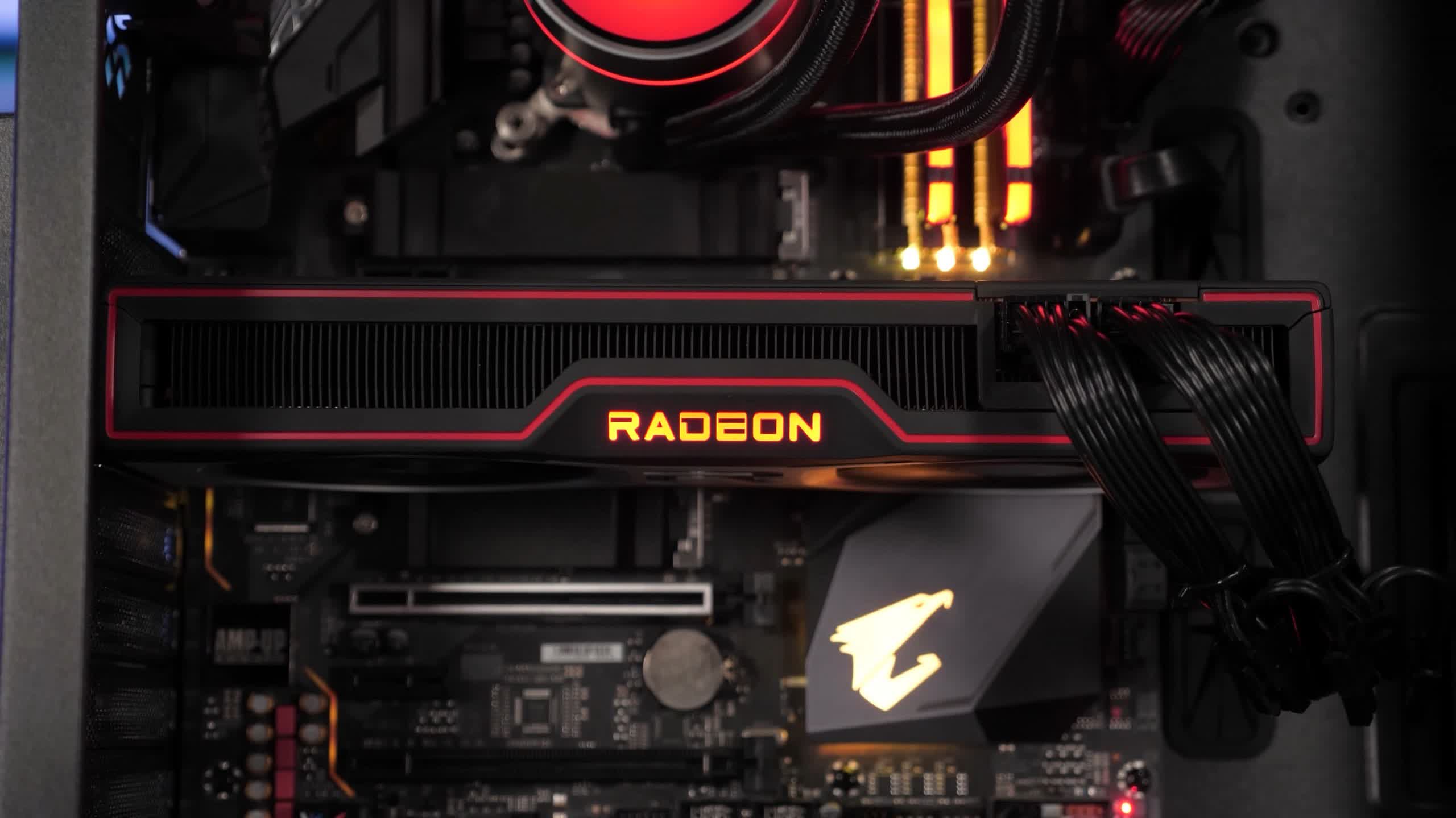
However, today there's a clearer path to better GPU prices and room for prices to finally go down. Nvidia needs to keep shipping only LHR GPUs to manufacturers. Miners may hate it, but cards with reduced mining performance are better for gamers, and there's always the uncapped RTX 3090 if you need something without restrictions.
AMD also has a role to play here. The Radeon RX 6700 XT and 6600 XT are currently the two best value GPUs for cost per frame, which I believe has led to the gears finally ticking over on RTX 3060 Ti production – the great pressure of competition. While these GPUs have far from a perfect price tag, especially the 6600 XT, if AMD can pump these out and keep prices closer to the MSRP, this will have beneficial effects across the market.
